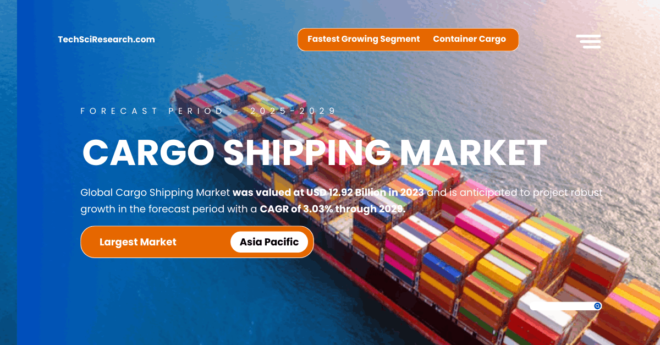
The cargo shipping market is an integral part of global trade and is responsible for facilitating the seamless transportation of goods across borders. In 2023, the market size stood at USD 12.92 billion, and it is projected to grow at a compound annual growth rate (CAGR) of 3.03% through 2029.
This report delves into the dynamics of the global cargo shipping market, including its segmentation, drivers, challenges, and future trends.
Cargo Shipping Market Overview
Segmentation of the Cargo Shipping Market
The cargo shipping market is broadly categorized into four main segments:
- Liquid Bulk Cargo: Includes oil, chemicals, and liquefied natural gas (LNG).
- Dry Bulk Cargo: Comprises raw materials like coal, iron ore, and grain.
- General Cargo: Encompasses various goods that require specialized handling.
- Container Cargo: Involves goods transported in standardized containers, now the dominant segment due to efficiency and flexibility.
Role in Global Trade
Cargo shipping serves as the backbone of international trade, providing the necessary infrastructure to move goods from manufacturers to consumers. It supports industries ranging from energy and agriculture to retail and manufacturing.
Browse over XX market data Figures spread through XX Pages and an in-depth TOC on the “Global Cargo Shipping Market” @ https://www.techsciresearch.com/report/cargo-shipping-market/20819.html
Key Cargo Shipping MarketDrivers
Expansion of Global Trade
The rise of global trade, driven by economic growth and international partnerships, has significantly boosted demand for cargo shipping. Emerging markets like India and China have seen rapid industrialization, creating substantial shipping demand for raw materials and finished goods.
E-commerce Boom
The explosive growth of e-commerce platforms such as Amazon, Alibaba, and JD.com has transformed consumer behavior. As customers demand faster and more reliable deliveries, cargo shipping companies must innovate and expand to support these logistical needs.
Technological Advancements
Technological innovations have revolutionized the cargo shipping market. Key advancements include:
- Automated Port Operations: Improve handling efficiency and reduce costs.
- Digital Tracking Systems: Offer real-time cargo monitoring and enhanced logistics management.
- Autonomous Vessels: Reduce labor costs and increase operational efficiency.
- Blockchain and IoT: Provide transparency and security across the supply chain.
Challenges Facing the Cargo Shipping Market
- Environmental Regulations
Stringent environmental policies by the International Maritime Organization (IMO) aim to reduce greenhouse gas emissions and improve fuel efficiency. These regulations require shipping companies to invest in cleaner fuels and technologies, posing financial challenges.
- Port Congestion and Infrastructure Limitations
High cargo volumes and aging infrastructure lead to congestion at major ports worldwide. This results in delays and increased costs, emphasizing the need for modernization and expansion of port facilities.
- Rising Fuel Costs
Fuel costs constitute a significant portion of operational expenses. The adoption of alternative fuels, such as liquefied natural gas (LNG) and ammonia, is essential but involves high upfront costs and technological hurdles.
Cargo Shipping Market Emerging Trends and Opportunities
Sustainable Shipping Practices
The industry is witnessing a shift towards greener technologies. Investments in LNG-powered and ammonia-powered vessels demonstrate a commitment to sustainability and compliance with environmental regulations.
E-commerce Integration
Collaborations between e-commerce platforms and cargo shipping companies are increasing. These partnerships aim to create end-to-end logistics solutions that include last-mile delivery, ensuring faster and more reliable services.
Digital Transformation
Digitalization and automation are set to redefine the cargo shipping landscape. Innovations such as AI-driven logistics, predictive analytics, and smart shipping solutions are becoming integral to improving operational efficiency.
Cargo Shipping Market Performance by Industry
Dominance of the Manufacturing Segment
The manufacturing sector is the largest contributor to the cargo shipping market. It encompasses a diverse range of goods, including:
- Machinery and automotive parts.
- Consumer electronics.
- Apparel and textiles.
The rise of globalization and outsourcing of production to cost-effective regions has amplified the need for robust cargo shipping services.
Regional Insights of the Cargo Shipping Market
- Asia-Pacific: A Global Manufacturing Hub
Countries like China and India dominate the manufacturing and shipping sectors due to their industrial capabilities and extensive export networks.
- North America and Europe
These regions remain significant players, driven by technological adoption and advanced port infrastructure.
Recent Developments
- CMA CGM’s LNG-Powered Vessels (2024): Reducing fuel costs and emissions, signaling a shift towards sustainability.
- Maersk’s Ammonia-Powered Ships Initiative: Represents an innovative approach to mitigating rising fuel expenses and environmental impact.
Key Players in the Cargo Shipping Market
Prominent companies shaping the cargo shipping market include:
- A.P. Moller-Maersk A/S
- MSC Mediterranean Shipping Company SA
- CMA CGM S.A
- Orient Overseas Container Line Ltd.
- China COSCO Shipping Corporation Limited
These firms are at the forefront of adopting innovative technologies and sustainable practices.
Download Free Sample Report @ https://www.techsciresearch.com/sample-report.aspx?cid=20819
Customers can also request 10% free customization on this report.
Future Outlook of Cargo Shipping Market
Advancements in Technology
The adoption of digital tools and autonomous technologies will streamline operations and improve service quality.
Sustainability as a Priority
With stricter environmental regulations on the horizon, green shipping solutions will gain traction, ensuring compliance and enhancing the industry’s reputation.
Continued E-Commerce Growth
The e-commerce sector will remain a driving force, demanding faster and more efficient shipping solutions.
Conclusion
The global cargo shipping market is a cornerstone of international trade, driving economic growth and connectivity.
While challenges such as environmental regulations and infrastructure limitations persist, the industry’s commitment to innovation and sustainability ensures its adaptability. Fueled by technological advancements and the e-commerce boom, the market is poised for steady growth, playing a pivotal role in the interconnected global economy.
You may also read:
Automotive Pumps Market Size to Reach USD 13.63 Billion by {2029}, Growing at a CAGR of 8.40%
Car Door Latch Market Overview: Projected Growth at 5.50% CAGR to USD 5.10 Billion by {2029}
Fuel Pumps Market Growth Forecast: USD 6.56 Billion [USD 6.56 Billion, 4.05% CAGR by 2029]
